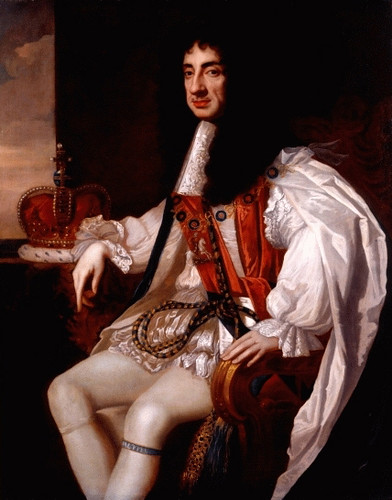Despite a few setbacks at the outset Parliament, claiming God to be a forsworn roundhead, eventually stuck it to the King and his Cavaliers at the Battle of Naseby in 1646. They were prepared to let Charles remain King if he was a good boy, but he wasn’t. In fact he was very naughty and gave them the slip, raised another army to squash them with but was beaten and had his head chopped off as a reprimand. His son, Charles, went to France but would return later.

Charles II with a big hairdo - by lisby1
Parliament now found themselves in possession of a novelty. They had a country unfettered by a Monarch. They began to dream great dreams of a Republican world and everybody being saintly and good and God viewing England as the finest resort on Earth. It would appear that they got a little too over-excited though for the common man. For, in what was possibly the worst political manifesto ever, they came up with the splendid notion of banning Christmas.
Something that really upset the Puritan regime was the lax morals of their less educated subjects. And Christmas was the worse time for it. People imbibed alcohol in great quantity, got rowdy in the streets and dabbled in a spot of light-hearted fornicating with their neighbours.
They would appoint a King of Mis-rule, whose express job it was to come up with extravagant ways to make mischief. Getting drunk during Church service was a popular act. As was harassing religious persons. For 12 days of Christmas life was a hoot.
The Puritans said “It has to go.” They declared that all this shameless revelry was an offense in the eyes of God and had to stop. Christmas, they said, was a time for penitence over past misconduct, for fasting and for prayer. And as an extra godly bonus, they outlawed football too.
One can hardly blame them I suppose. There is something a little incongruent one feels about celebrating the Lord’s birth with acts which flagrantly disregard his teachings. Scripturally, perhaps, Parliament were onto something, but politically they had dropped a clanger.
When government officers began fining people for making mince pies and holding clandestine Christmas dinner parties, your average man began to get fed up. In Puritan American there were even chaps called ‘Mince Sniffers’ who had trained their noses to ferret out illicit delicacies.
Soon people began to remember good old King Charles. “Wasn’t he a lark” you could hear them say. “I’m not saying I agree with Catholics” said another “but Christmas is far more fun with them, what?”
This kind of chatter was inevitably going to lead to something bigger. When Cromwell died the clamour was heard for a return of Charles’ son, the later Charles II. He was shrewd and spoke nostalgically of Christmas festivities in England of old. This was just the fellow for the English, one only had to look at his giant beehive haircut to see he knew how to have a good time. He was the Party of Fun as opposed to the Party of Purity.
When the announcement came in 1660 that Charles, with his enormous hairdo, was going to be installed as King Charles II, there was great merrymaking and lots of balloons. Charles obliged them by reinstating all the boisterous aspects of Catholic Christmas. Britain’s experiment with a Republic would have to wait, and so would God and his morals.
No comments:
Post a Comment
Feel free to share your thoughts and observations.